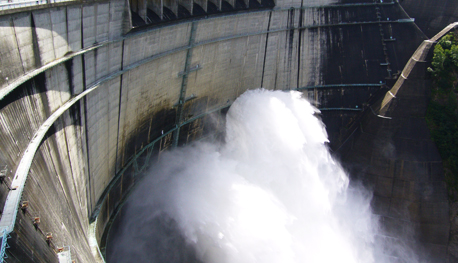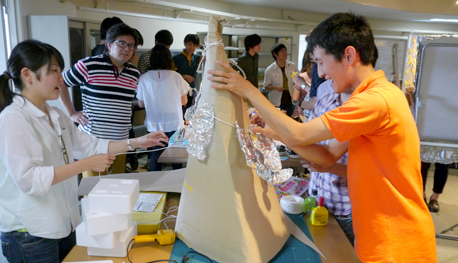Education
the Civil and Environmental Engineering Undergraduate MajorCurriculum
Specialized education built on a broad foundation — a solid footing for researchers and engineers
Building on the foundational courses in science taken in the first year, students progress to 200- and 300-level courses that teach principal fields of civil and environmental engineering. Courses are available in structural mechanics and engineering, hydraulics and water-related engineering, geotechnical engineering, construction material engineering, infrastructure planning, and common basic subjects, so that students may acquire broad and systematic knowledge in the discipline. Additionally, there are project and laboratory courses that are intended to deepen the students' understanding of the technology, planning, and design involved in the discipline, and to develop their ability to work in teams and put their knowledge into practice. The proceeding Independent Research Project not only enhances these applied skills and understanding, but develops the creative skills of students as well.
-
1st Year
- 100-Level Courses
-
Students in their first year of undergraduate studies receive basic education that centers on Institute-wide compulsory courses regardless of their discipline. The 100-level courses are designed to teach common and basic skills that are required of students in science and technology. The aims of these courses are to provide knowledge and cultivate versatile intellect necessary for studying at the Institute.
-
2nd Year
3rd Year- 200-Level and 300-Level Courses
-
Students who complete their 100-level courses advance to study their undergraduate major. Courses at the 200- and 300-levels specific to the Civil and Environmental Engineering Undergraduate Major are taken in accordance with the curriculum.
-
- Projects and Integrated Studies Courses
- Project courses are a required part of study for undergraduate students. In an environmental planning project, students are tasked with surveying the regional environment and proposing plans for improvement. In an urban planning project, students are tasked with infrastructure planning and design. Internship courses and special lectures by invited experts in various fields are also available.
-
- Common and Basic Courses
- Courses cover subjects that are necessary for the study of the discipline. These include mathematics, numerical analysis methods, engineering ethics, civil engineering history, surveying, and practical English for engineers and researchers.
-
- Infrastructure Planning and Design
- What kinds of infrastructure development are necessary for society? How should we plan the development and management of these infrastructures? And how should these all be realized? By taking courses in infrastructure planning and design, students are taught the basic methods of thinking that would enable them to delve into these questions as engineers and put their ideas into practice. Basic theories associated with infrastructure planning, urban planning, transportation planning and systems, landscape architecture, civil engineering planning processes, and public systems are covered.
-
- Hydraulics and Water-related Engineering
- Maintenance of rivers, coasts, and man-made infrastructures such as waterworks and sewerage systems are an essential part of urban and national land development. Courses are made up of lectures that teach the basic theories needed for understanding, designing, and managing these water infrastructures, and exercises and laboratory work that deepen this understanding. In these courses, students acquire the basic expertise necessary for flood control and aquatic environment conservation.
-
- Structural Mechanics and Structural Engineering
- Students study the fundamentals of structural and mechanical aspects involved in the design, construction, and safety management of various structures upon which society depends.
-
- Construction Material Engineering
- Many of the civil engineering structures that make up social infrastructure are built using concrete. In order to be able to build structures that are safe, durable, and earthquake resistant in an economical manner, it is important to be familiar with the properties of concrete and the design methods used in creating concrete structures. Lectures and experiments in construction material technology teach students basic theories and offer knowledge that are of practical use.
-
- Geotechnical Engineering
- Through courses in geotechnical engineering, students gain basic knowledge and learn about theories related to natural ground, on which infrastructures such as roads, railways, harbors, and airports sit, and geomaterials, which are used in the construction of infrastructures such as dams, embankments, and tunnels. More specifically, students will learn the mechanical properties of soil, methods of soil investigation, design and construction of geotechnical structures, and technologies related to geohazard risk reduction.
- Course relation chart for Civil and Environmental Engineering Undergraduate Major at Tokyo Tech OCW
- List of 200-level core courses related to the Civil and Environmental Engineering Undergraduate Major at Tokyo Tech OCW
- List of 300-level core courses related to the Civil and Environmental Engineering Undergraduate Major at Tokyo Tech OCW
-
-
4th Year
- 200-Level and 300-Level Courses
-
At the final stage of the 300-level is the Independent Research Project (equivalent to the Undergraduate Thesis Research that was in place previously). The project is intended to serve as a capstone for students to consolidate and reinforce all of the skills acquired in their major. Furthermore, they may choose to enroll in the Advanced Independent Research Project. The purpose of this course is to enhance student interest in scientific and technological research that began with the Independent Research Project, as it provides the opportunity for them to actively engage in science- and technology-related activities.
* The timeline depicts a standard case where students complete their bachelor's degree program in four years.
- Course relation chart for Civil and Environmental Engineering Undergraduate Major at Tokyo Tech OCW
- List of 200-level core courses related to the Civil and Environmental Engineering Undergraduate Major at Tokyo Tech OCW
- List of 300-level core courses related to the Civil and Environmental Engineering Undergraduate Major at Tokyo Tech OCW
-
Entrance Examination
Students need to pass an entrance exam to advance from a bachelor's to a master's program. To advance from a master's to a doctoral program, students must pass an advancement assessment.
-
Graduate Majors
Master's Program
Doctoral Program- 400-Level, 500-Level, and 600-Level Courses
-
Students who complete the Civil and Environmental Engineering Undergraduate Major may continue to study the discipline in more depth by taking the Civil Engineering Graduate Major. Closely related interdisciplinary graduate majors to which students may advance are the Urban Design and Built Environment, and Engineering Sciences and Design Graduate Majors.
-
- Department that offers this graduate major
-
- Civil and Environmental Engineering
-
- Departments that offer this graduate major
-
- Architecture and Building Engineering/
- Civil and Environmental Engineering
-
- Departments that offer this graduate major
-



